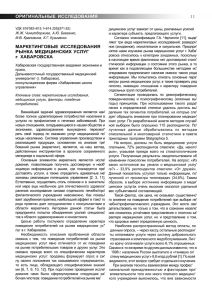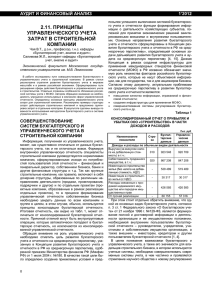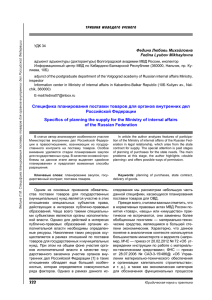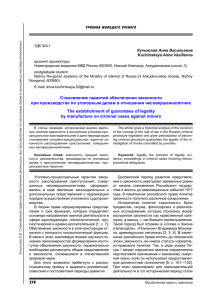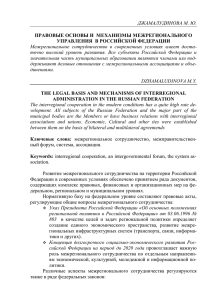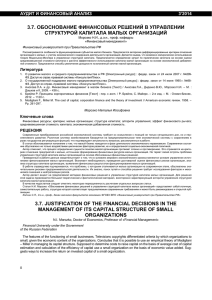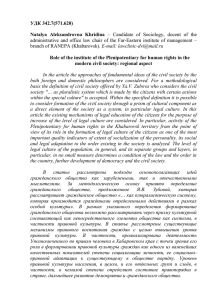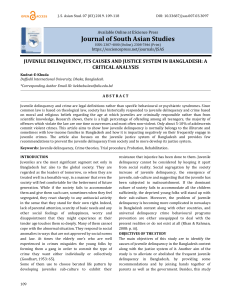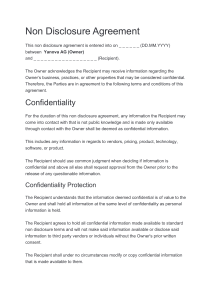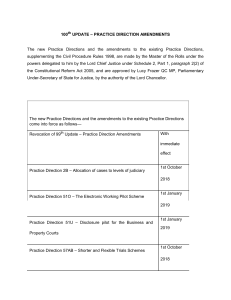УДК 347.9 Tatyana Yur`evna Novikova – Сandidate of
реклама
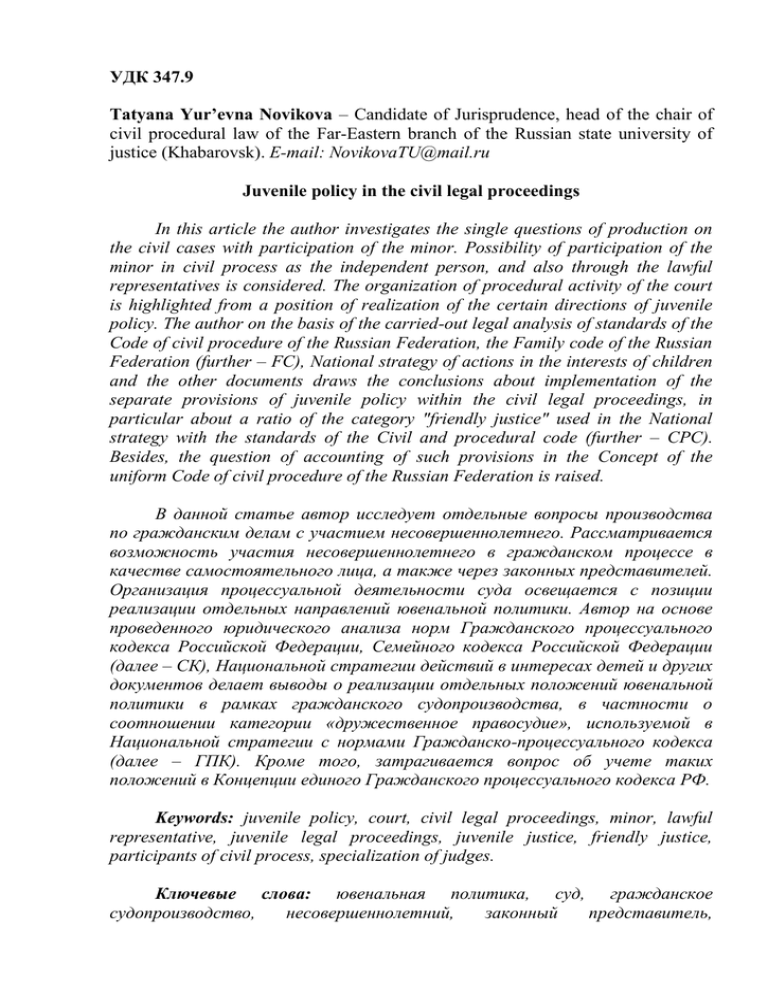
УДК 347.9 Tatyana Yur’evna Novikova – Сandidate of Jurisprudence, head of the chair of civil procedural law of the Far-Eastern branch of the Russian state university of justice (Khabarovsk). E-mail: NovikovaTU@mail.ru Juvenile policy in the civil legal proceedings In this article the author investigates the single questions of production on the civil cases with participation of the minor. Possibility of participation of the minor in civil process as the independent person, and also through the lawful representatives is considered. The organization of procedural activity of the court is highlighted from a position of realization of the certain directions of juvenile policy. The author on the basis of the carried-out legal analysis of standards of the Code of civil procedure of the Russian Federation, the Family code of the Russian Federation (further – FC), National strategy of actions in the interests of children and the other documents draws the conclusions about implementation of the separate provisions of juvenile policy within the civil legal proceedings, in particular about a ratio of the category "friendly justice" used in the National strategy with the standards of the Civil and procedural code (further – CPC). Besides, the question of accounting of such provisions in the Concept of the uniform Code of civil procedure of the Russian Federation is raised. В данной статье автор исследует отдельные вопросы производства по гражданским делам с участием несовершеннолетнего. Рассматривается возможность участия несовершеннолетнего в гражданском процессе в качестве самостоятельного лица, а также через законных представителей. Организация процессуальной деятельности суда освещается с позиции реализации отдельных направлений ювенальной политики. Автор на основе проведенного юридического анализа норм Гражданского процессуального кодекса Российской Федерации, Семейного кодекса Российской Федерации (далее – СК), Национальной стратегии действий в интересах детей и других документов делает выводы о реализации отдельных положений ювенальной политики в рамках гражданского судопроизводства, в частности о соотношении категории «дружественное правосудие», используемой в Национальной стратегии с нормами Гражданско-процессуального кодекса (далее – ГПК). Кроме того, затрагивается вопрос об учете таких положений в Концепции единого Гражданского процессуального кодекса РФ. Keywords: juvenile policy, court, civil legal proceedings, minor, lawful representative, juvenile legal proceedings, juvenile justice, friendly justice, participants of civil process, specialization of judges. Ключевые слова: ювенальная политика, суд, гражданское судопроизводство, несовершеннолетний, законный представитель, ювенальное судопроизводство, ювенальная юстиция, дружественное правосудие, участники гражданского процесса, специализация судей. The policy as a set of conceptual ideas, tasks and directions predominates in any sphere of public life. It allows by accumulation of the main ideas to set the purposes, to see the development prospects. The ideas, containing in it, have to correspond to the current state of development of the society, and the mechanisms of realization of the goals to be effective, moral, legal. From this point of view it would be desirable to analyze modern rules of the civil legal proceedings concerning minors from the position of achievement of the objectives of juvenile policy of the actions designated in the National strategy in the interests of children for 2012 - 2017 [3]. Within the civil process there is a protection of family, housing, labor and the other law of minors. Therefore development of the mechanisms of civil protection is an important and significant element of the constitutional state. Art. 37 of CPC [1] provides that by the general rule the persons who reached 18 years participate in the civil process. The exception is made for the persons who are married or emancipated. The same provisions are repeated by the Family code of the Russian Federation (Art. 56) [2], supplementing with the provision on possibility of appeal to the court of the persons who reached 14 years at violation of their rights and legitimate interests by the parents. The specified codified acts provide opportunity for the minor to participate in the civil process by the means of lawful representatives in other cases. Independent participation is provided for the limited amount of cases. Giving the present possibilities depends on age, being of a question and desire of the person. In particular, at implementation in the court of protection of the rights, freedoms and legitimate interests of minors aged from 14 till 18 years by the lawful representatives the court is obliged to recruit in the case of minors. For the same category of minors independent participation for the solution of a question of their full capacity (emancipation) (Art. 21 of FC, ch. 32 of CPC) is provided, indemnification (Art. 1074 of CPC). Art. 56 of FC fixes the possibility of realization of such right in a case of non-performance or inadequate performance by the parents (or one of them) obligations for education, bringing up of the child or at the abuse of parental rights. Besides, according to the Article 57 of FC, since ten years the child has the right to be heard during any judicial proceedings affecting its family rights. And at the solution of the questions of change of a name and surname of the child, restitution of parents in the family rights, adoption, entering into the documents of the record about adoptive parents as parents, establishment of the guardianship or guardianship over the children without parental support, the court is obliged to attract him in the process, having resolved the specified questions only from his consent. The minor can act in the civil process as the party on the case (the claimant, the respondent, the applicant) or the witness. As the participant of civil process, the minor has the full volume of rights and duties provided to this subject of the civil and procedural relations. In this regard his legal status is equal to the legal status of the other participants of the process. The lawful representative also has the full volume of rights and duties however his participation is predetermined by the interrelation and dependence on the interests of the minor. After all, participation of the lawful representative imposes on him a duty to work in the interests of the minor, as much as possible considering the possibilities of ensuring his interests. Such situation allows realize in full guarding sense of the precepts of law and the institutes, to provide operation of protective mechanisms concerning the considered category of citizens. In item 19 of the Resolution of Plenum of the Supreme Court of the Russian Federation of 24.06.2008 No. 11 (edition of 09.02.2012) "About preparation of civil cases for judicial proceedings" [5] is emphasized that if a proceedings are initiated according to the statement of the minor aged from 14 till 18 years in the cases provided by the federal law on the cases arising from the civil, family, labor, public and other legal relationship, the judge should discuss a question of need of attraction to participation in the case of the lawful representatives of the minor: parents, adoptive parents, trustees. For the solution of the most important questions of protection of the rights and legitimate interests of minors the National strategy of actions in the interests of children for 2012 - 2017 (further – National strategy) [3], approved as the Decree of the Russian President of June 1, 2012 No. 761 was adopted. This backbone document regulates the main directions of development of the state policy concerning children, including some strategic questions of judicial system and legal proceedings in the relation (with participation) of minors. As it is specified in this document, the main goal of National strategy – to determine the main directions and problems of the state policy in the interests of children and the key mechanisms of its realization which are based on the conventional principles and norms of international law. Thus, it is noted that National strategy is developed taking into account the Strategy of the Council of Europe for protection of the rights of the child for 2012 - 2015 which includes the following main objectives: contribution to the emergence of services and systems, friendly to the child; eradication of all forms of violence against children; guaranteeing the rights of children in situations when the children are especially vulnerable. National strategy concretizes these purposes in relation to the Russian legal system and provides implementation of the work on certain directions. Development of the juvenile legal proceedings is included as one of the called directions and introduces into the legal circulation as a key concept the term "friendly justice". In this context the category "friendly justice" is meant "… as a system of civil, administrative and criminal legal proceedings guaranteeing respect of the rights of the child and their effective providing taking into account the principles enshrined in the recommendations of the Council of Europe about justice for children and also taking into account the age, degree of maturity of the child and understanding by him the case" [3, item 1 of the section VI]. According to the author, this concept belongs to the field of international rather, than to the traditions of national right and introduces into the circulation one more estimated category without definition of the criteria of its existence and use. The after all called criteria characterizing "friendliness" and till today were present at the civil procedural legislation, however, "friendliness", proceeding from the analysis of the Explanatory note of National strategy, didn't create. One more disputable category which is present at this definition is "effective ensuring the rights of the child". Thus, it is summarized that the existing system does it inefficiently, but essential changes in its activity isn't programmed. After all, speaking about the inefficiency, it is necessary to determine that reason and to offer serious program actions that doesn't follow from the essence of the concept and isn't made in specified period in the civil process. As a positive moment it should be noted the initiative stated within the National strategy about investment of the Plenipotentiary for Children at the federal and regional levels with the right for appeal to the court in protection of the rights and interests of minors. This offer expresses long ago and is confirmed by the law-enforcement practice. However the operating Civil procedural law (further – GPL) doesn't provide such opportunity, within the Concept of the uniform CPC of such idea didn't sound. Thus, the Concept of uniform CPC [7, item 9 ch. 5], paying attention to the questions of regulation of legal status of the persons participating in the case provides investment with the similar rights of the Representative of the Russian Federation on protection of the rights, freedoms and legitimate interests of citizens, the Plenipotentiary for the President of the Russian Federation on protection of the rights of businessmen, and also authorized on protection of the rights, freedoms and legitimate interests of citizens and businessmen in the subjects of the Russian Federation. As well as in many subjects of Federation, in the Khabarovsk territory in pursuance of the recommendation stated in the National strategy the regional document – the Regional strategy of actions in the interests of children for 2012 2017 approved by the Order of the governor of the Khabarovsk territory of October 10, 2012 No. 515-r (further – Regional strategy) was accepted [4], – where an attempt to prove "friendliness of justice" and necessary components of development of the regional legislation and the law-enforcement practice in this direction was also made. However this section of the Regional strategy looks a little inconsistently. First, the section is called "Creation of the system of protection and ensuring the rights and interests of children and the justice, friendly to the child", and the short analysis of situation is under construction only on the analysis of activity of the Commission on affairs of minors and protection of their rights (further – CAM), the Plenipotentiary for Children in the Khabarovsk territory and insufficiency of work of the law enforcement agencies on neutralization of the facts of children's violence, and, respectively, covers only the first part of the declared question. There are no words about the organization of justice. Of course, the right to change the justice system at the regional level isn't granted to provide to the subjects of Federation, however, interaction of the authorized bodies in the field of minors, to plan organizational actions, including to resolve the questions of use of the social workers of juvenile justice, the content of rehabilitation work with minors and some other on the places it is possible. Nevertheless, these actions weren't provided to the realization neither within this Concept, nor in the other documents of regional level. Coming back to the National strategy, it should be noted that the basic principles and elements of justice, friendly to the child, are called: • general availability; • compliance to the age and development of the child; • immediate decision-making; • orientation on ensuring the requirements, rights and interests of the child; • respect of the personality and dignity of the child, his private and family life; • recognition of the key role of a family for survival, protection of the rights and development of the child; • active use in the trial of data on the children, conditions of their life and education received by the court in the order established by the law; • strengthening of guarding function of the court in relation to the child; • priority of recovery approach and measures of educational influence; • special training of the judges for minors’ cases; existence of a system of specialized auxiliary services (including services of reconciliation), and also procedures and norms of public control over the observance of the rights of children. Concerning the last position it is possible to note that the speech about special training of judges for hearing of the cases with participation of minors goes since 2000. In the Resolution of Plenum of 14.02.2000 No. 7 (edition of 06.02.2007) "About jurisprudence on the cases of crimes of the minors" [6] the Supreme Court of the Russian Federation specified that such specialization of judges for minors provides a need of ensuring their professional competence by the training and professional development not only according to the matters of law, but also pedagogic, sociology, psychology. Meanwhile, the document already became invalid, and provisions weren't realized fully. Whereas such preparation has conceptual value and could be one of the guarantees of realization of the guarding and recovery approach to the work with the persons which didn't reach eighteenyear age. The same declarative character has also the declared provision on the priority of recovery approach and the measures of educational influence. Concerning the strengthening of guarding function of justice among all changes made to CPC, in recent years, it is possible to note only the norms of ch. 22.2 of CPC regulating consideration of the applications production about return of the child or about implementation concerning the child of access rights on the basis of international treaty of the Russian Federation. Of course, activity of the subjects of Federation realizing the pilot projects concerning the juvenile legal proceedings testifies to the partial or full accounting of these provisions in the regional legislation and the law-enforcement practice. The Khabarovsk territory isn't among such subjects. In the Regional strategy it is objectively specified that "… all above-mentioned is insufficiently introduced in the Khabarovsk territory" [3]. Objectively there are only some provisions about which existence it is possible to speak today. However it is also objectively possible to say also that the legislative base not provides implementation of the called provisions in all cases. In particular, "immediate decision-making" is called one of the elements. If to correlate it to the name of the section, it is possible to draw a conclusion on the need of fast response to any offense concerning the child or the offense made with his participation. However such requirement doesn't correspond to the lack of specialization of all bodies and services in the field of minors. And without it is almost impossible to demand an effective solution at the time minimum. Besides, one more painful point – organization of interaction of the court with the other bodies and services in the field of minors is formed that is also not fulfilled and legislatively isn't fixed today. The activity of all subjects has to be consecutive, differently it is inefficient, and the common goal is unattainable. In the Khabarovsk territory the attempt to direct attention to the improvement of juvenile legal proceedings was made in 2011 when the Khabarovsk regional court and the government of the Khabarovsk territory concluded the cooperation agreement in the questions of introduction in the territory of juvenile technologies [8]. For this purpose in the Central district court of Komsomolsk-on-the Amur the specialized judicial structure considering the cases as one of the parties in which the minors act was created. Then the decision on establishment at the Khabarovsk regional court of the Coordination council incorporating representatives of the bodies of executive and judicial authority dealing with the cases of minors was made. Under this agreement the juvenile court had to work within the pilot project calculated before the termination of 2012 and on its results consideration of the question of expediency of introduction of juvenile technologies in the Khabarovsk territory and their widening to the other courts of the territory was supposed. But the agreement was realized only partially. Today the analysis of lawenforcement practice isn't made and to speak, respectively, about the results and possibility of distribution of experience is impossible. It is necessary for the solution of the questions posed, having taken experience of the Rostov and Saratov regions as a basis, at the legislative level to resolve a question of the importance of juvenile justice, of the features of creation of the legal proceedings concerning minors and coordination of the actions of juvenile bodies and services for the qualitative, effective and fastest permission of the questions concerning minors that will answer to the recommendations of the Council of Europe and taken course by Russia for every possible protection of the rights and interests of the children who got to a justice orbit. Literature and the sources: 1. Гражданский процессуальный кодекс Российской Федерации от 14.11.2002 № 138-ФЗ (ред. от 06.04.2015) // Собрание законодательства РФ. – 2002. – № 46. – Ст. 4532. 2. Семейный кодекс Российской Федерации от 29.12.1995 № 223-ФЗ (ред. от 13.07.2015) // Собрание законодательства РФ. – 1996. – № 1. – Ст. 16. 3. Указ Президента РФ от 01.06.2012 № 761 «О Национальной стратегии действий в интересах детей на 2012 – 2017 годы» // Собрание законодательства РФ. 2012. № 23. Ст. 2994. 4. Распоряжение губернатора Хабаровского края от 10.10.2012 № 515-р «О краевой стратегии действий в интересах детей на 2012 – 2017 годы» // Собрание законодательства Хабаровского края. – 2012. – № 10(123). 5. Постановление Пленума Верховного суда РФ от 24.06.2008 № 11 (ред. от 09.02.2012) «О подготовке гражданских дел к судебному разбирательству» // Бюллетень Верховного суда РФ. – 2008. – № 9. 6. Постановление Пленума Верховного суда РФ от 14.02.2000 № 7 (ред. от 06.02.2007) «О судебной практике по делам о преступлениях несовершеннолетних» (утратил силу) // Бюллетень Верховного суда РФ. – 2000. – № 4. 7. Концепция единого Гражданского процессуального кодекса Российской Федерации (одобрена решением Комитета по гражданскому, уголовному, арбитражному и процессуальному законодательству ГД ФС РФ от 08.12.2014 № 124(1)) // Документ опубликован не был. КонсультантПлюс, 2014. 8. Соглашение в защиту подростков: Хабаровский край осваивает механизмы ювенальной юстиции // Власть судебная. – 2011. – № 1(7).
